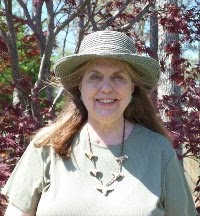 Award winning author and poet, Penny Harter, stops by Blogging Along Tobacco Road this week with her response to Haiku - Three Questions.
Award winning author and poet, Penny Harter, stops by Blogging Along Tobacco Road this week with her response to Haiku - Three Questions.Hi Curtis,
Bill reminds me that I've been meaning to answer your three questions. My answer to your first question is excerpted from my essay in The Unswept Path: Contemporary American Haiku (edited by John Brandi and Dennis Maloney, © 2005).
1. Why do you write haiku?
Writing haiku opens my mind, my senses, and my spirit. It helps me get in touch with what is most important—paying attention to what I’ve called, “that click in the gut,” or ‘leap of the spirit.” When asked to define poetry, I have always said that writing a poem is, first and foremost, an act of seeing, followed by connecting. Writing haiku helps me to feel relationship between myself and other, so that, in a way, I become other. . . . Both my haiku and longer poems result from a sudden awareness of connection between a perception and the feelings that arise from it, or from my sensing a unique relationship between and among aspects of the object or experience perceived, remembered, or created.
For me, each haiku I write is like breathing out, giving back to the earth recognition, affirmation, and gratitude. I am reminded of how seldom we really notice what is going on around us, and how important the most ordinary things can be. Writing haiku is one way of translating the Earth--honoring what the mountain, the dragonfly, the neighbor, and even the dirt under our feet mean to our existence. Whether we know it or not, we are one with them. The writing and sharing of haiku can bring us together as we celebrate our connections with the larger world that we share, while at the same time affirming the particular times and places of our lives and our human responses to them.
2. What other poetic genres do you enjoy? (Agreeing with Charles Trumbull, I changed "forms" to "genres" in your question.)
I like to read all kinds of poetry, from William Carlos Williams' epic, Paterson, and the work of numerous contemporary American poets, to poetry in translation from many cultures. I appreciate haibun and tanka, and have written both. Most often, I read and write longer poems--what to call them? Organic verse? Free verse? Lyric poetry? All these names have been assigned to "regular" poems as opposed to haiku and other genres of Japanese origin. And recently I've written a few sonnets. Those who may be interested in my published collections of longer poems can visit my web site through Bill's and my mutual portal at http://www.2hweb.net, where a number of my published books have their own pages, with sample poems. And my now out-of-print book of haiku for children, Shadow Play is also featured there, with examples of both the illustrations and haiku. (I invite readers to visit the publisher's page for my new book The Night Marsh at http://www.wordtechweb.com
3. Of the many wonderful haiku you've written, what do you consider to be your top three? (Please provide original publication credits.)
This is a hard one. I don't rate poems like that. That said, I do very much like the following three, the first two of which appeared in The Unswept Path (mentioned above); "evening rain" also appeared in The Heron's Nest; "fog shrouded" is previously unpublished.
evening rain
I braid my hair
into the dark
closed bedroom door —
her shadow darkens
the crack of light
fog shrouded
this morning's robin sings
inside me
Thanks for what you're doing here.
Penny
Next week, Paul MacNeil.

2 comments:
Dear Penny,
Henry Brann and Robin Palley love your robin poem. Cape May fog?
Hi, five years later, scrolling back through various links, I find I never answered this. Not Cape May fog, but Mays Landing fog. And thanks for the kind words!
Post a Comment